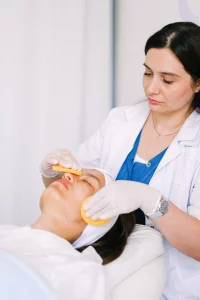written by Julia Stovba
The world of skincare is rapidly evolving as researchers uncover the intricate connection between the skin’s microbiome and overall skin health.
This article delves into the emerging science of microbiome skincare, highlighting its importance, the factors that influence it, and the innovative products and practices designed to promote a healthy skin ecosystem.
Understanding the Importance of pH Balance
The skin’s pH plays a crucial role in maintaining a healthy skin microbiome. Our skin’s natural pH is slightly acidic, with a pH level of around 4.5 to 5.5. This acidic environment helps inhibit the growth of harmful bacteria while promoting the growth of beneficial microorganisms.
Disrupting the skin’s pH balance by using alkaline skincare products or exposing the skin to environmental stressors can lead to an imbalanced microbiome and contribute to skin issues.

To maintain an optimal pH balance, it’s essential to choose skincare products that are pH-balanced and specifically formulated to support the skin’s natural acidity. Avoid using harsh, alkaline soaps or cleansers that can strip the skin of its protective acid mantle.
The Role of Diet and Lifestyle in Skin Microbiome
Health Diet and lifestyle factors also have a significant impact on the skin’s microbiome. A balanced diet rich in antioxidants, healthy fats, and prebiotic and probiotic foods can support a healthy skin ecosystem. Some examples of skin-friendly foods include:
- Prebiotic-rich foods: Vegetables, fruits, and whole grains that contain dietary fiber can help nourish the skin’s beneficial bacteria.
- Probiotic-rich foods: Fermented foods like yogurt, kefir, sauerkraut, and kimchi can help replenish the skin’s microbiome.
- Antioxidant-rich foods: Berries, leafy greens, and nuts are packed with antioxidants that can help protect the skin from environmental stressors and promote a healthy microbiome.
In addition to a balanced diet, maintaining a healthy lifestyle can support a well-balanced skin microbiome. Prioritize regular exercise, stress management, and sufficient sleep to ensure overall well-being and optimal skin health.
The Emerging Science of Microbiome
Skincare As our understanding of the skin’s microbiome deepens, the field of microbiome skincare is rapidly evolving. Skincare brands are increasingly incorporating microbiome-friendly ingredients into their products, such as prebiotics, probiotics, and postbiotics. These ingredients can help maintain a healthy skin ecosystem, address skin issues, and support overall skin health.
Innovative Microbiome Skincare Ingredients
As the field of microbiome skincare expands, new ingredients are being discovered and incorporated into products to support a healthy skin ecosystem. Some of these innovative ingredients include:
- Bifida ferment lysate: A probiotic ingredient derived from the Bifidobacterium species, which can help strengthen the skin’s barrier function, improve hydration, and reduce the appearance of wrinkles and fine lines.

- Lactobacillus ferment: A probiotic ingredient from the Lactobacillus species, known to have soothing and anti-inflammatory properties that can help calm sensitive skin and reduce redness.
- Galactomyces ferment filtrate: A yeast-derived ingredient with antioxidant and skin-brightening properties, which can help even out skin tone and improve the appearance of dull or tired-looking skin.
- Alpha-glucan oligosaccharides: A prebiotic ingredient that can help support the growth of beneficial skin bacteria and improve the skin’s barrier function.
- Postbiotic compounds: Ingredients like lactic acid and hyaluronic acid, which are naturally produced by probiotic bacteria and can help exfoliate, hydrate, and brighten the skin.
Personalized Microbiome Skincare
As our understanding of the skin’s microbiome advances, the concept of personalized microbiome skincare is gaining traction. This approach recognizes that each person’s skin microbiome is unique, and therefore, skincare products and routines should be tailored to an individual’s specific needs. Some potential developments in personalized microbiome skincare include:
- Skin microbiome testing: At-home or in-office testing to analyze an individual’s skin microbiome and provide personalized recommendations for skincare products and routines.
- Customized probiotic formulations: Skincare products containing a tailored blend of probiotics designed to address an individual’s unique skin concerns and microbiome needs.
- Personalized prebiotic and postbiotic treatments: Skincare products and treatments featuring a customized combination of prebiotic and postbiotic ingredients to support an individual’s skin microbiome and address specific skin concerns.
Microbiome Skincare and Skin Conditions
As the connection between the skin’s microbiome and various skin conditions becomes clearer, microbiome-targeted treatments for acne, eczema, rosacea, and other skin concerns are being developed.
By focusing on restoring and maintaining a healthy skin m
icrobiome, these treatments aim to alleviate the underlying causes of skin issues and provide long-lasting relief.
Collaboration Between Skincare and Medical Professionals
The growing interest in microbiome skincare has prompted collaboration between skincare professionals and medical experts, such as dermatologists and microbiologists.
This interdisciplinary approach allows for a more in-depth understanding of the skin’s microbiome and its role in skin health, paving the way for more effective and targeted skincare solutions.
Demystifying Microbiome Skincare Myths
As the microbiome skincare movement gains momentum, it is essential to address some common misconceptions and myths surrounding this emerging field. Educating consumers and skincare professionals about the science behind microbiome skincare will help ensure that the benefits of these innovative products and treatments are fully realized.
- Myth: All bacteria on the skin are harmful. Truth: The skin’
s microbiome is a diverse ecosystem, consisting of both beneficial and potentially harmful bacteria. A healthy skin microbiome is marked by a balance of these microorganisms, with beneficial bacteria helping to protect the skin from harmful pathogens, reduce inflammation, and maintain the skin’s natural barrier function.
- Myth: Probiotic skincare is only for those with skin issues. Truth: While probiotic skincare can be especially beneficial for individuals with skin concerns such as acne, eczema, or rosacea, it can also be advantageous for individuals with
 normal or healthy skin. Probiotic skincare products can help maintain and support the skin’s microbiome, promoting overall skin health and resilience.
normal or healthy skin. Probiotic skincare products can help maintain and support the skin’s microbiome, promoting overall skin health and resilience. - Myth:All probiotics are the same. Truth: There is a vast array of probiotic strains, each with its own unique benefits and characteristics. Different probiotic strains may be more effective for specific skin concerns or types, and it is essential to choose skincare products with probiotics tailored to your skin’s unique needs.
- Myth:Microbiome skincare is a passing trend. Truth: Microbiome skincare is supported by a growing body of scientific research, demonstrating its potential to revolutionize the way we approach skin health and beauty. As our understanding of the skin’s microbiome and its role in skin health continues to evolve, microbiome skincare is poised to become an integral part of skincare routines and treatments.
By debunking these myths and promoting a better understanding of the skin’s microbiome, skincare professionals and consumers can make more informed choices about the products and treatments they use.
The emerging field of microbiome skincare represents a significant shift in the way we approach skin health and beauty. By recognizing the vital role that the skin’s microbial ecosystem plays in maintaining overall skin health, we can better address a wide range of skin concerns and promote a more holistic approach to skincare.
As innovative products and treatments continue to be developed, it is crucial for both skincare professionals and consumers to stay informed about the latest research and advances in this area. By embracing the microbiome skincare revolution, we can work together to achieve healthier, more radiant, and resilient skin for everyone.








